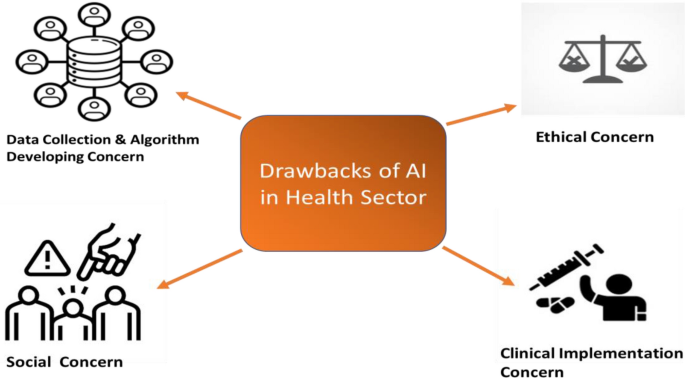With cancer being the second leading cause of death in the European Union, responsible for 23% of total deaths in 2020, there is a growing focus on leveraging Artificial Intelligence (AI) to revolutionize cancer prevention, diagnosis, and treatment. Approximately 40% of these cancers could be prevented through early detection and lifestyle changes such as not smoking or regular exercise. The integration of AI in healthcare offers hope for significant progress in the prevention and treatment of cancer. Now due to AI, Doctors are believing that AI could improve cancer patients’ prognosis.
Recent studies demonstrate that AI could revolutionize healthcare by providing novel approaches to cancer prevention, diagnosis, treatment, and management across a variety of therapeutic domains (e.g., oncology, cardiology, and ophthalmology) and throughout the entire value chain (i.e., from R&D to production to marketing). Improvements in care for patients are anticipated.

Just looking at the market cap makes it clear that AI is making waves in the healthcare industry. Putting aside the thriving AI startup scene, healthcare solutions are now offered by 18 out of 47 multinationals that provide AI. Eighty percent of them provide novel approaches to healthcare delivery, while twenty percent provide efficiency-based technologies to enhance healthcare technology and optimize resources.
For healthcare, what does artificial intelligence entail precisely?
Oncology, cardiology, and ophthalmology are just a few of the many therapeutic areas that stand to benefit from AI’s ability to revolutionize cancer prevention, diagnosis, treatment, and management. This is true across the whole value chain, from R&D to production to marketing. Better treatment for patients is the overall goal.
From a high-level analysis of the market, it is clear that artificial intelligence (AI) is making great strides in the healthcare industry. Even ignoring the booming startup scene in artificial intelligence, healthcare solutions are a current offering from 18 of the 47 multinationals that provide AI. Of these, 80% provide novel treatment-focused solutions and 20% provide efficiency-based technologies to enhance healthcare technology and optimize resources.
In particular, six domains are expected to benefit from AI:
In the field of medicine, artificial intelligence (AI) has the potential to speed up the discovery of novel medicines by sifting through mountains of data in search of useful chemical combinations and predicting how well they will work. The technology is expected to revolutionize drug development by facilitating faster clinical research through the identification of trial eligibility and analysis of trial data.
By assessing medical data (such as X-ray pictures, lab findings, and individual medical histories), AI can assist clinicians in making quicker and more accurate diagnoses. The best course of therapy may be determined with the aid of AI algorithms that can spot early symptoms of illness. There are several examples of effective applications of machine learning algorithms; one such example is the Wisconsin Breast Cancer program, which obtained a classification accuracy of 98.53% when used to diagnose breast cancer.
When it comes to complicated surgical operations, such as preoperative planning, intraoperative techniques, and postoperative complication prediction, artificial intelligence (AI) may be a great aid to surgeons. Patients benefit from increased accuracy and a shorter recovery time after surgery thanks to AI-assisted surgical robots.
Patients’ vital indicators, such as heart rate, blood pressure, and blood sugar levels, may be tracked by AI systems, which can then notify healthcare providers of any irregularities. Patients with chronic conditions stand to benefit greatly from this since it will allow for close monitoring and prompt treatment if problems arise.
Individualized care: Artificial intelligence (AI) can sift through mountains of medical records to find the best course of action for each patient by considering their unique genetic makeup, health history, lifestyle choices, and many other characteristics.
Improved efficiency and accuracy in medical record administration with enhanced security for patient information is possible with the use of artificial intelligence (AI) by automating electronic medical record management.
Procedure for the diagnostic announcement
The market for medical diagnostics supported by AI is doing quite well compared to the other categories mentioned. Its current value is $1.3 billion, and projections show a yearly growth rate of more than 23% through 2028, when it will reach $3.7 billion. In instance, medical image analysis software hosted in the cloud is in high demand. Among the first to reap the benefits of the technology will be fields like mammography, CT scans, and MRIs.
However many healthcare facilities are unable to acquire the necessary technology, which prevents them from fully realizing AI’s promise. For example, most European universities do not have the technology to digitize the pathology slides used to train artificial intelligence models, even though this is the gold standard for analyzing biological abnormalities.

Supervision, encouragement, and tracking of outcomes following therapy
AI has the potential to revolutionize cancer treatment by freeing up medical practitioners to concentrate on high-value activities like clinical trials, providing direct psychological and physical support to patients, and making important technical decisions. The healthcare system can become more efficient and patient outcomes can improve as a result.
Particularly, the technology stands to improve three areas:
Administrative resources can greatly reduce the amount of time your doctor spends on mundane duties. With the use of automated transcription software, some of these might aid in the completion of medical records by tracking patient flow, reducing administrative strain, and documenting notes.
Predictive analytics technologies, classify patients into various health groups by mining and analyzing massive amounts of patient data. More efficient and tailored care is possible because of this.
Surgical support tools are driven by artificial intelligence, built on medical robots. Even for very minor surgical operations like stitching, these technologies are nonetheless utilized much too frequently.
Medical practitioners may now utilize digital medical equipment to remotely analyze health data obtained from patients’ homes through remote monitoring. This enables them to make informed decisions regarding their care. Regular monitoring is the goal of remote monitoring systems, which aims to enhance patients’ health.
There is a vast array of programs that may incorporate chatbots, such as Messenger and Slack. Their use is multi-faceted and most beneficial during the monitoring phase when ongoing assistance is vital to the patient’s recovery.
Healthcare AI’s limitations
Still, some obstacles must be surmounted before we can fully experience the advantages of AI-assisted healthcare, despite all the promising possibilities.
To begin with, from a purely technological standpoint, AI is still in its early stages of development. For instance, data cleaning and transmission might be a challenge because to the lack of a standardized format for data health. Additionally, most AI solutions need human training—and not just any people, either. To include the demands of the medical community in new AI, engineers will need to work closely with healthcare experts to listen to their feedback.

It’s obvious that we also need to think about ethical and societal factors. Even though the General Data Privacy Regulation (GDPR) of the European Union gave people greater say over how businesses handle their personal information, data privacy is still a major concern for many people. To some extent, those worries should be allayed by the European Union AI Act, the first ever all-encompassing law to control AI systems that endanger human health, human rights, and safety.




